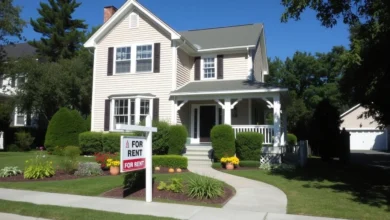How to: Sell Your Home Without an Agent
Home Selling Easy Without Agent Or Broker

When putting your house on the market, you are faced with a difficult decision: should you contact a real estate agent and lose a portion of your profit, or sell it on your own? While the latter is more challenging, it is also potentially more profitable. Buyers are often more interested in “For Sale By Owner” (FSBO) homes, as they know the asking price won’t include a hefty commission for a real estate agent. Here’s a guide to selling your home without an agent, including expert tips and detailed steps to ensure a successful sale.
1. Create Curb Appeal
First impressions matter greatly when selling a home. Buyers often form an opinion of the property within moments of arriving, making curb appeal a key factor. To improve your home’s curb appeal, consider small enhancements that don’t require a large budget:
- Landscaping: A neat lawn, trimmed hedges, and a few strategically placed flower beds can significantly improve curb appeal.
- Exterior Touch-Ups: Simple touches like painting the front door, cleaning windows, and pressure-washing the driveway or sidewalk can add to the home’s appeal.
- Lighting: Outdoor lighting, like pathway lights or porch lights, can enhance the home’s charm, especially for evening viewings.
Remember, the inside of your home should also be inviting and well-kept. Clean and declutter each room, focusing on key areas like the kitchen and bathrooms. Small repairs and a fresh coat of paint on focal walls can also make a big difference.
2. Prepare for Your Next Home
Planning for your next home is essential before listing your current property. Since FSBO homes can sometimes sell quickly, you’ll want to ensure you’re financially and logistically prepared for a move. Here’s how:
- Pre-Approval: Obtain pre-approval for your next mortgage so that when your current home sells, you can move forward without delays.
- Future Home Search: Start exploring neighborhoods and homes that meet your needs. Evaluate factors like school districts, proximity to work, and community amenities.
- Down Payment Planning: Consider using the proceeds from the sale of your current home as a down payment on your next property. Planning ahead will give you flexibility and help streamline the buying process.
3. Determine Your Asking Price
Setting the right price is crucial to attracting buyers and maximizing profit. Without an agent’s assistance, you’ll need to conduct a bit of research:
- Research Market Trends: Look at recent sales of similar homes in your neighborhood. Online real estate platforms often provide tools to compare home values, helping you establish a competitive price.
- Consider Appraisal Value: If your tax appraisal is low, you can often set your price slightly above it, as homes typically sell for more than their tax value.
- Account for Expenses: While FSBO sellers save on agent commissions, they still need to account for closing costs, advertising fees, and any repairs. Calculate these costs to ensure your asking price covers all expenses and leaves room for profit.
4. Market Your Home Effectively
Marketing is a critical component of any FSBO sale. Here are some ways to promote your home effectively:
- Yard Signs: A simple “For Sale” sign in the front yard can attract local buyers. Ensure the sign is visible from the street and includes your contact information.
- Online Listings: Leverage free online platforms like Craigslist, Zillow, and Facebook Marketplace to reach a broader audience. Many FSBO sellers find success on social media, where listings can be shared among local community groups.
- Professional Photography: Quality photos are essential for online listings. Hiring a professional photographer can make your home appear more attractive and draw more attention online.
- Virtual Tours: If you want to stand out, consider offering a virtual tour of your home. This can be especially useful for out-of-town buyers or those who prefer an online viewing before visiting in person.
5. Show Your Home Like a Pro
Showing your home effectively can make all the difference. Here are tips to make viewings successful:
- Flexible Scheduling: Make the property as accessible as possible to accommodate potential buyers’ schedules. The more accessible your home is, the quicker it may sell.
- Staging: Set up each room to highlight its best features. For example, arrange furniture to create a sense of space, or add tasteful décor to create a warm and inviting environment.
- Let Buyers Explore: Allow buyers to explore the home on their own without feeling rushed or crowded. Be present to answer questions, but give them space to imagine themselves living in the home.
- Minimize Distractions: Arrange for pets or young children to be elsewhere during showings, ensuring a calm and comfortable experience for buyers.
6. Negotiation and Closing
Negotiating without an agent can be intimidating, but it also gives you full control over the sale. Here’s how to manage this stage:
- Set Negotiation Goals: Decide on your minimum acceptable offer beforehand to avoid on-the-spot decisions.
- Prepare for Inspections: Most buyers will arrange for a home inspection before finalizing a purchase. Be ready for any findings and decide in advance whether you’re willing to make repairs or adjust the price.
- Engage a Closing Attorney: In many states, a real estate attorney can help with paperwork, legal disclosures, and ensure a smooth closing process.
Upon finalizing negotiations, you and the buyer will set a closing date. You’ll need to move your belongings and prepare the home for the buyer’s move-in. On closing day, sign the necessary paperwork, including the title deed, and pay any outstanding closing costs. Once completed, you’ll hand over the keys and receive your payment, allowing you to settle your mortgage and start your next chapter.




